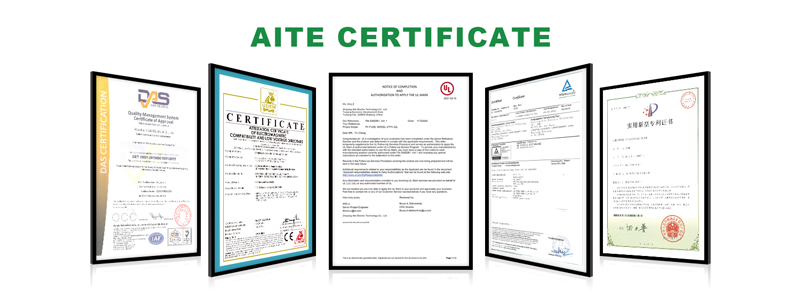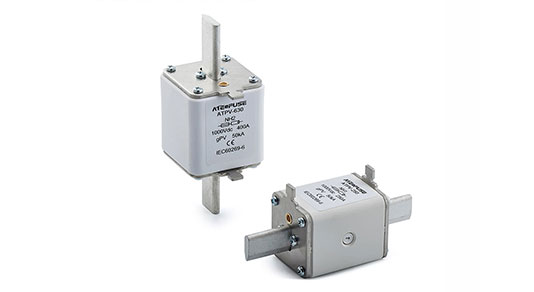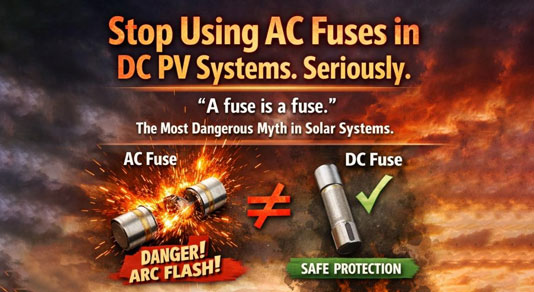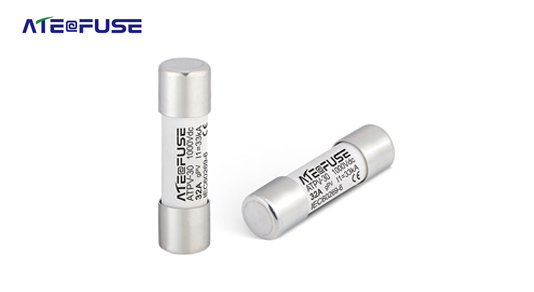Photovoltaic Fuse (PV Fuse) – Comprehensive Guide
AITE Official Technical & Standards Interpretation
Definition: A photovoltaic fuse is a type of overcurrent protection device designed for DC photovoltaic (PV) systems. Its primary role is to prevent damage to solar modules, combiner boxes, inverters, and energy storage systems caused by fault currents.
Core Function: Rapidly disconnect fault current → Ensure circuit and equipment safety.
Main Applications: PV module strings, PV combiner boxes, inverter DC inputs, battery storage systems.
Common Certifications & Standards: TÜV, CE, UL, GB, IEC.
Typical Designations: gPV (PV-specific), gG/gL (general-purpose), aBat/gBat (battery protection).
1. What is a Photovoltaic Fuse?
A Photovoltaic fuse (PV fuse) is a protective device specifically engineered for PV DC systems. Compared with standard fuses, it can operate reliably under conditions such as low fault current, prolonged DC voltage, and wide temperature variations. Its main purpose is to quickly break the circuit when the current exceeds the rated value, thereby protecting PV modules, inverters, and energy storage systems.
2. Why Must PV Systems Use Specialized Fuses?
DC Characteristics: PV systems operate on direct current. DC arcs are harder to extinguish than AC arcs → specialized fuses are required.
Low Fault Current: Fault currents in PV arrays may be too low to trigger conventional fuses → gPV-type fuses are specifically designed for this.
Harsh Environmental Conditions: Outdoor installation requires resistance to high temperatures, UV radiation, and humidity.
Long-Term Reliability: Designed for long service life, ensuring safe operation over 20+ years of PV plant operation.
3. Main Certification Standards for Photovoltaic Fuses
|
Standard |
Full Name |
Region |
Applicability / Value |
|
TÜV |
Technischer Überwachungsverein |
Germany / Europe |
Strict safety and reliability requirements |
|
CE |
Conformité Européenne |
European Union |
Complies with EU regulations; mandatory marking |
|
UL |
Underwriters Laboratories |
USA / North America |
Safety certification; market entry requirement in the US and North America |
|
GB |
National Standard |
China |
Essential for product selection in Chinese market projects |
|
IEC |
International Electrotechnical Commission |
International |
Widely accepted for international projects and cross-border engineering |
Note: All AITE photovoltaic fuses are certified to TÜV, CE, UL, GB, and IEC standards, ensuring global market compatibili

4. Fuse Code Guide: How to Choose the Right Product
|
Code |
Type |
Characteristics |
Typical Applications |
Recommended Models |
|
gPV
|
PV-Specific |
High DC voltage resistance, responsive to low fault currents |
PV module strings, combiner boxes |
ATPV-30Ø10×38,ATPV-32LØ10×85, ATPV-80 Ø22×58 |
|
gG / gL |
General-Purpose |
Full-range protection, covering overload and short circuit |
Distribution systems, cable protection |
NH000,NH00,NH1,NH2,NH3,NH4 |
|
gR / gS |
Semiconductor Protection |
Fast response, protects IGBT and inverters |
PV inverters, power electronics |
ATCT-00,ATCT-2 |
|
aBat / gBat |
Battery Protection |
Designed for energy storage systems, protects against short circuit and overload |
Battery storage, UPS systems |
ATES-30GL72, ATES-10GL55 |
5. Application Scenarios of Photovoltaic Fuses
PV Power Plants: Protects module strings, preventing a fault in a single string from damaging the entire array.
Combiner Boxes: Prevents local short circuits from propagating, enhancing overall system safety.
Inverter DC Inputs: Protects power semiconductor devices.
Energy Storage Systems: Prevents battery short circuits or abnormal discharges from causing hazards.
6. AITE Quality & Standards Commitment
As a professional fuse supplier, AITE adheres to the following principles in R&D and production:
Full-Process Inspection: Every stage, from raw materials to finished products, undergoes rigorous testing.
International Certifications: The entire PV fuse series is certified to TÜV, CE, UL, GB, and IEC standards.
Customized Solutions: Personalized designs and solutions can be provided based on customer system parameters.
Long-Term Reliability: Ensures stable operation throughout the 20+ year lifecycle of PV power plants.
Contact Us for Technical Information
Phone: +86-57762628880
Email: sales@aitefuse.com
12-Hour Sales Support:
Cindy: +86 18066371992 Amy: +86 13373851810
Alex: +86 18989752663 Rachel: +86 18158332550
7. Frequently Asked Questions (FAQ)
Q1: Can a PV system use a standard gG fuse?
A1: Not recommended. Standard fuses cannot handle the low fault current and high DC voltage characteristics of PV systems. gPV-type fuses are required.
Q2: How to choose the rated current of a fuse?
A2: Typically, select 1.6–2.5 times the maximum operating current of the PV module.
Q3: Can AITE products be exported to Europe and North America?
A3: Yes. The products are certified with CE, TÜV, UL, and other international standards, making them suitable for global markets.
Conclusion
Photovoltaic fuses are critical components for ensuring the long-term safe operation of PV systems. AITE is committed to following international standards and driven by technological innovation to provide customers with safe, reliable, and compliant fuse solutions.





